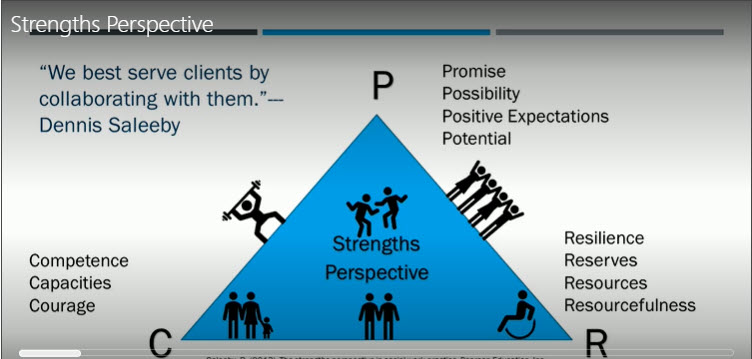9 Strengths-Based and Resilience Theories
Alexandria Lewis

Content Outline, Competency, and KSAs
I. Human Development, Diversity, and Behavior in the Environment
1A. Human Growth and Development
KSA: Strengths-Based and Resilience Theories
overview
Strengths-based and resilience theories are pivotal concepts in the social work field, emphasizing the importance of identifying and leveraging the inherent strengths of individuals, families, groups, and communities to navigate and overcome adversity. These theories shift the focus from pathology and deficits to resilience, capabilities, and innate potential for growth and healing.
Strengths-Based Perspectives
Collaborative Model of Social Work Practice
The collaborative model of social work practice is a strengths-based approach and can be used within the phases of social work practice. This approach considers three theoretical “propositions” and three principles of practice (Poulin, 2010). Collaboration is a partnership versus helping professionals as experts. The NASW Code of Ethics includes the right to self-determination. We can honor clients’ self-determination by working collaboratively with them in a helping relationship. In situations where a client has limits to self-determination, helping professionals should be transparent about the choices (or lack of) clients have in their work with them. Depending on the agency/setting, some clients have limited choices/options.
Practice Principle 1:
- The focus is on the client’s strengths and viewing the client as the expert in their own lives. There is an emphasis on the collaborative partnership between the social worker and the client system. Poulin (2010) noted, “engaging clients in a collaborative helping relationship increases clients’ ownership of their decisions and ultimately their level of self-determination (pp. 52-53).
Examples of strengths based questions:
- What do you do well?
- What are the best three moments you can recall in your life?
- What is the best thing you have ever made happen?
- Which of your life challenges has taught you the most about your own resilience?
- What sources of strength did you draw from as you faced these challenges?
- What are your hopes, visions, and aspirations?
- What gives you a sense of purpose?
Practice Principle 2 :
- Put Clients in Charge of the Helping Process: Engage in empowerment by giving some power and control to clients. Recognizing one’s power is critical for social workers because power does impact how clients interact with helping professionals.
Poulin (2010) noted there are three types of power of helping professionals:
- Expertise power (knowledge and skills)
- Referent power: “Referent power or persuasion, derived from their interpersonal skills…” (Poulin, 2010, p. 53).
- Legitimate power: Role/position at your agency, such as the ability to make decisions that impact the service delivery of clients and management of resources (i.e., Poulin refers to this as controlling resources).
Practice Principle 3:
- Continually Evaluate Your Work and the Client’s Progress: Routine evaluation of one’s practice as part of the helping relationship should be ongoing.
Practice Principles
There are three practice principles of this model:
- Practice Principle 1: Focus on Client Strengths
- Practice Principle 2: Put Clients in Charge of the Helping Process
- Practice Principle 3: Continually Evaluate Your Work and the Client’s Progress
Strengths Perspective Principles
“Every individual, group, family, and community has strengths.” -Dennis Saleebey
The strengths perspective posits that every individual, regardless of their situation, possesses strengths and abilities that can be harnessed to solve problems and achieve goals. This perspective encourages social workers to work collaboratively with clients, recognizing and building upon their capacities, talents, competencies, possibilities, visions, values, and hopes, rather than focusing solely on their problems and limitations.

Tenets of the strengths perspective:
- Every individual, group, family, and community has strengths.
- Everyone has the capacity to grow.
- Collaboration is essential in working with clients.
“Trauma and abuse, illness and struggle may be injurious, but they may also be sources of challenges and opportunity.” – Dennis Saleebey
Resilience Theories
Resilience theories in social work and psychology are diverse, each offering unique insights into how individuals and communities can adapt to and overcome adversity.
Resilience theory highlights:
- Ecological Resilience Theory: This theory, developed by Urie Bronfenbrenner, emphasizes the importance of the environment in shaping an individual’s ability to cope with stress. It posits that resilience is fostered through positive interactions within the layers of an individual’s environment, including family, community, and broader societal systems. It suggests that the support and resources available in these environments play a critical role in an individual’s capacity to thrive despite challenges.
- Psychological Resilience Theory: This approach focuses on individual traits and processes that enable people to navigate through hardships. Key components include positive emotions, optimism, the ability to maintain a sense of control, and the capacity to see failure as a form of helpful feedback. Carol Dweck’s work on “growth mindset,” which underscores the idea that abilities and intelligence can be developed through dedication and hard work, is often associated with this form of resilience.
- Social Resilience Theory: This theory looks at how social support and community networks contribute to resilience. It highlights the role of relationships and social capital in providing emotional support, resources, and a sense of belonging that can help individuals and communities recover from adversities.
- Family Resilience Theory: Developed by Froma Walsh, this theory centers on the family as a unit, exploring how family systems adapt to and recover from stressful events. It identifies key family processes that contribute to resilience, such as shared positive beliefs, open emotional communication, and flexible family organization.
- Post-Traumatic Growth (PTG) Theory: PTG theory, proposed by Richard Tedeschi and Lawrence Calhoun, suggests that experiencing trauma can lead to significant personal growth, including a greater appreciation of life, improved personal relationships, increased personal strength, changed priorities, and a richer existential and spiritual life. This theory focuses on the transformative potential of trauma, rather than just recovery to a baseline level of functioning.
- Neurobiological Resilience Theory: This perspective examines the biological bases of resilience, exploring how genetic factors, brain plasticity, and neuroendocrine responses to stress influence an individual’s ability to cope with adversity. It underscores the interplay between biological mechanisms and environmental influences in shaping resilience.
Resource: Resilience Theory-A Summary of the Research
References
Poulin, J. (2010). Strengths-based generalist practice: A collaborative approach (3rd ed.). Wadsworth, Cengage Learning. Inc.
Saleebey, D. (2013). The strengths perspective in social work practice. Pearson Education, Inc.

